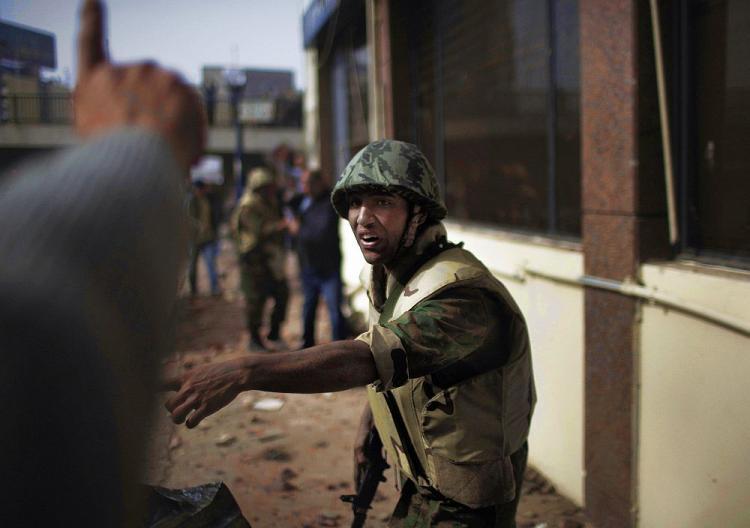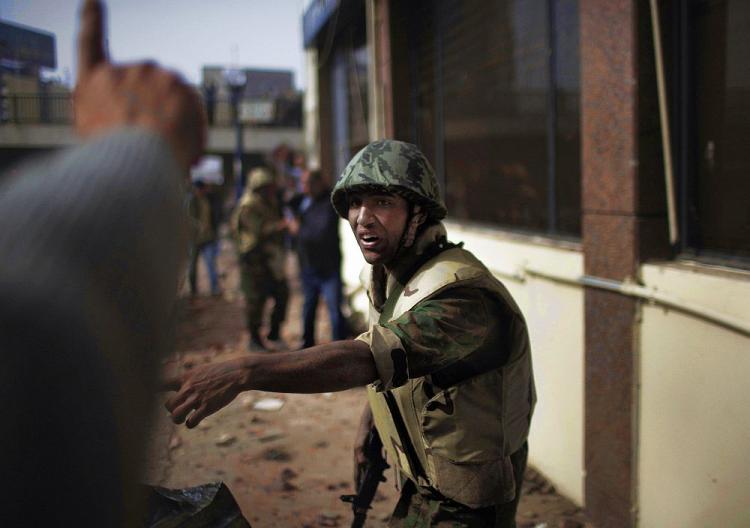A committee formed by the opposition groups to negotiate Egypt’s transitional government, expressed that it will not enter talks while Mubarak is still in power.
Speaking to ABC from his heavily guarded palace where he is staying with his family, Mubarak made the comments, saying he would like to leave office immediately but won’t over fears of escalating the chaos.
Mubarak’s comments came as Egypt entered another day of deadly protests, similar to Wednesday’s, with clashes between pro- and anti-government protesters.
Two shooting attacks from nearby buildings hit Tahrir Square on Thursday. Asem Tageldin, a protester on the square told The Epoch Times, that he knew of 10 people who died in the attacks.
On Saturday, the newly appointed vice president was given the task of negotiating with opposition groups. The groups, which consist of several youth movements, some independents, the al-Wafd Party, and the Muslim Brotherhood, which is officially banned in the country, had already formed a negotiation committee.
While the opposition elements would not normally be unified in their views of Egyptian politics, they have come together to present unified demands. According to Tageldin, who says he sees himself as independent, the basic demand is, “Mubarak, step down!” he said. “And then we start negotiating with the transitional government, but as long as Mubarak is in power there will be no negotiating with the government.”
On the opposition negotiating committee is at least one senior member of the Muslim Brotherhood, Nobel Peace Prize winner Mohamed ElBaradei, and Ayman Nour, leader of the El Ghad Party, who spent three years in jail for his pro-democracy activities.
The International Crisis Group, an international organization that focuses on resolving deadly conflicts, says both sides need to give something to end this stalemate and allow peace to move forward.
“The authorities, so far, have not suggested any willingness to concede on this point,” read a statement from the crisis group. “In this light, it is becoming increasingly difficult to imagine Egypt’s peaceful transition while [Mubarak] remains in office.” Since the opposition says it will not enter talks until Mubarak steps down and the violence against them ends, both sides may need to show some flexibility to resolve the situation, advised the Crisis Group.
A compromise might be hard to find. Protesters in the northern region of Egypt including Alexandria, say in their minds, Mubarak is already counted as gone, it’s only a question of time for him to actually leave office, said Mohamed Yusuf, an engineer and classical artist in Alexandria.
Not all anti-government protesters have returned to the streets, but are considering the big picture of the situation. Sally, a recently graduated dentist currently at home in Alexandria, said she stayed in on Thursday and spent the day analyzing Egypt’s Constitution with other friends.
“One of the main reasons why the demonstrations took place was to change the constitution,” says Sally.
In particular, protesters have wanted to change Article 76 that sets strict requirements on who can run for president. Article 77 sets the term for presidency at six years, but there is no limit to the number of terms. Article 88 puts the electoral process under supervision of the Parliament, so there is no guarantee the elections will be fair and free.
A problem Sally and her friends found in carefully reading the constitution is that the constitution can only be amended if there is a permanent residing president, not an interim president or just a vice president, she said.
So, the opposition has two choices, she said. “Let Mubarak stay and give up demonstrations now,” or “we can make a revolution and by that we can change the constitution.” However, to do the latter, the Egyptian army would have to be involved, she said, and so far the army has remained neutral.
The international crisis group states one priority for the government is to “undertake the extensive reforms—to the constitution, the elections law, and the political parties law—necessary to ensure that future elections are free and fair.”
On the Streets
In Cairo, an estimated 50,000 anti-government demonstrators prepared to spend the night on Tahrir Square readying for another large-scale demonstration called for Friday, the only full weekend day in Egypt.
The mass demonstrations are focused on Cairo. Yusuf, in Alexandria, says there are no police on the streets in Alexandria where the situation is peaceful, unlike in Cairo.
On Tageldin Square, however, people are gathering from other parts of the country. More people are trying to come to Cairo as well, but government supporters have set up roadblocks to prevent them from joining. Anti-government protesters have reportedly also set up roadblocks to protect themselves from the pro-government protesters.
On Thursday, at dawn and noon, Tageldin said in a telephone call, they were under fire on the square from rooftops and the bridge. He said that anti-government protesters were able to catch some of the pro-government people and handed them over to the army.
“We caught a lot of them,” he said and “most of them carried police ID.”
One rumor circulating on the square, said Tageldin, was that the army would start enforcing the 3 p.m. curfew Friday night. When asked what would happen, he answered, “We just have to see.”







Friends Read Free